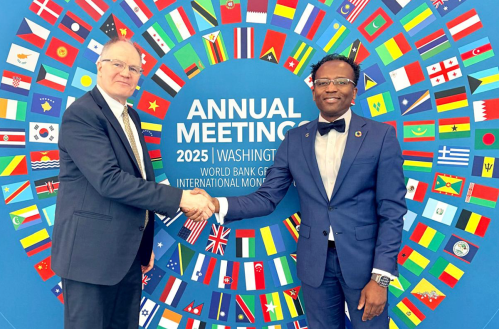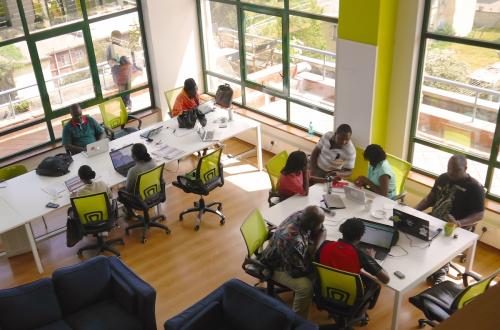Africa leads the world in entrepreneurial choice, with 22% of working-age individuals actively pursuing new ventures and African women twice as likely to become entrepreneurs as compared with their global counterparts. In addition, over 75% of young Africans intend to launch their own businesses within the next five years, as reported by a recent survey. Most of these businesses are created in the informal sector, which represents more than 85% of the labor force in sub-Saharan Africa.
From bustling markets in Lagos to neighborhood tailors in Abidjan and street vendors in Nairobi, micro-entrepreneurial activities are at the heart of many African economies and constitute livelihoods given a lack of formal job opportunities. They are also a response to local demands for goods and services that are adapted to the unique sociocultural and historical contexts of the settings from which they are generated. Yet for all their vibrancy and potential for growth, these economic activities remain precarious, undercapitalized, and constrained. At the heart of the issue lies an array of structural and institutional barriers: limited access to formal credit, low incentives for formalization, and widespread mistrust in institutions, among other factors. These constraints trap millions of entrepreneurs in subsistence or survivalist activities, limiting their potential to innovate, expand, and contribute meaningfully to economic transformation.
As I have found in my previous research (Nguimkeu 2014, 2016, 2022, 2024; Nguimkeu et Okou 2021, 2022), policy actions and institutional reforms can remove these constraints, turning African micro-entrepreneurship into a lever for inclusive growth on the continent.
The credit constraint problem
Despite the narrative of increased financial inclusion in African economic development literature, access to formal credit has remained elusive for most African micro-entrepreneurs. Only one-third to one-fifth of Small and Medium-size Enterprises (SMEs) in sub-Saharan Africa rely on formal bank loans and lines of credit to finance their investment. This proportion is even lower for agricultural SMEs, who receive less than 10% of commercial bank lending in most African countries.
Formal financial institutions often avoid lending to informal firms due to the lack of reliable financial records, lack of formal status, or their inability to produce required collateral. The latter is usually much higher than the amount of capital requested by entrepreneurs. According to the World Bank enterprise survey data, the median loan-to-collateral ratio in Africa is estimated at 60%, implying a collateral value of about 1.7 times the size of loan obtained. Even where microfinance institutions exist, their interest rates are often prohibitive, their administrative costs are very high and riddled with complex procedures, and their outreach is limited in rural or semi-urban areas. Entrepreneurs therefore tend to turn to family networks, personal savings, or other informal credit channels to finance their ventures. This lack of access to formal credit impedes entrepreneurs’ capacity to invest in equipment and technology, expand operations, and develop and grow in a way that allows them to move up the value chain.
Low incentive to formalize and mistrust in institutions
Given the credit constraint problem, we can ask ourselves the following question: Why don’t more entrepreneurs formalize in order to gain access to finance? The answer lies in the cost-benefit trade-offs of formal registration. In many African countries, formalization rates are low because the process exposes firms to complex tax regimes and burdensome regulations—such as high registration fees, lengthy business startup procedures, and prohibitive tax rates—with few tangible benefits in return. For example, the cost of formally starting a business in Cameroon in 2005 was estimated at 172% GNI per capita. Such registration costs are responsible for about an 8% reduction in formal enterprises, an estimate drawn from measures of both informal firms that avoid registration and new businesses that are never created. In addition, formalization rarely guarantees better services, social protection, or access to government procurement. Informality is hence a rational choice despite its restrictions on the ability to scale, hire skilled workers, and integrate into global value chains. While registration and taxation reforms can encourage formalization among certain highly productive firms, simulation studies have shown that no level of enforcement or tax reduction can decrease the size of informality below 25%-30% of the workforce—even when licensing is free and expedited. This suggests that the costs of formalization are more than offsetting its benefits, such that both micro-enterprises and large firms prefer to stay informal in general.
The preference for informal financial and regulatory arrangements is not only socioeconomic but also historical. Years of weak governance, predatory taxation, and unreliable legal systems have eroded trust in post-colonial formal institutions. Entrepreneurs often perceive banks as inaccessible and at odds with their reality, and they see governments as extractive rather than enabling. In the absence of trustworthy formal institutions, many turn to informal savings groups, rotating credit schemes (tontines), and family networks for support and mutual help. While these networks are available and resilient, they are usually costly and hardly scalable. They also reinforce exclusion by confining opportunities to social capital, rather than merit, risk-taking, or innovation.
Economic consequences
These barriers to micro-entrepreneurship in Africa, be they credit scarcity, informality traps, or unreliable institutions, among others, go beyond individual hardships to ripple across the structure and dynamics of the entire economy. As highlighted in several studies, these challenges systematically weaken business creation, slow innovation, intensify income inequality, increase vulnerability, and constrain overall economic growth.
Credit constraints create poverty traps as well as delays in business entry and formalization. In Cameroon, it takes on average seven years for prospective entrepreneurs to accumulate the capital required to start their firms, and several more years to become financially unconstrained entrepreneurs. This delay in firm creation reduces cumulative experience, hinders innovation, and compresses the lifecycle of firms. In aggregate, the result is a lower density of high-potential enterprises, with negative implications for job creation and economic dynamism.
In addition, my research with Cedric Okou shows that high levels of informality correlate with faster and broader transmission of pandemics, underscoring that informality may amplify the effects of external shocks and crises, leading to deeper and more persistent downturns.
Unreliable institutions compound these vulnerabilities, as households have little recourse beyond self-insurance through debt or mutual help within kinship networks. A deeper understanding of the economic consequences reinforces the urgency of policy action to address these constraints which does not only support entrepreneurs but shift the entire growth model toward one that is inclusive, dynamic, and resilient.
What can be done?
What can we do to alleviate these constraints? A growing body of research points to several promising directions. One is to expand access to fit-for-purpose finance by developing alternative credit scoring systems using mobile data, transaction histories, and utility payments. This includes promoting fintech and mobile banking platforms that reduce transaction costs and increase outreach while supporting credit guarantee schemes that reduce risk for lenders. Blended finance instruments such as grants, equity, and guarantees adapted to the informal sector context can increase micro-entrepreneurs’ ability to gain access to credit from public or private investors under conditions that are much better than those offered by traditional commercial lenders.
My coauthor Cedric Okou and I (2021) also highlight the transformative potential of digital platforms in bridging the gap between informality and finance, heralding that from e-wallets to e-commerce, digital technologies can help entrepreneurs build credit histories, access new markets, and formalize incrementally.
Appetite for the latter can be stimulated by simplifying registration procedures and tax regimes; offering tangible benefits such as access to government procurement, social protection, enforcement of property rights and contracts, or preferential loans; and creating gradual formalization pathways. Finally, it is imperative to strengthen trust in the formal sector by building accountable, transparent, and endogenous public institutions rooted in traditional norms and adapted to local beliefs that serve entrepreneurs, improve financial literacy and legal awareness, and encourage public-private partnerships to deliver services at scale.
Conclusion
Africa’s development trajectory depends on the dynamism of its entrepreneurs. Unlocking their business potential is not about formalizing every business overnight. It is about dismantling the invisible walls of exclusion that constrain them by creating an environment where credit is accessible, formality is rewarding, and institutions are trusted. This is the foundation for inclusive growth, structural transformation, and economic prosperity, and it requires more than microfinance or registration reforms. It calls for a new social contract that recognizes entrepreneurs as central drivers of innovation and job creation, leverages digital technologies to overcome the limitations of traditional banking models, and builds public institutions that resonate with the aspirations of local populations. These prerequisites will enable Africa’s informal entrepreneurs to evolve from subsistence survivalists to scalable business leaders.
The Brookings Institution is committed to quality, independence, and impact.
We are supported by a diverse array of funders. In line with our values and policies, each Brookings publication represents the sole views of its author(s).








Commentary
Entrepreneurship in Africa: Laying the groundwork for success
August 22, 2025